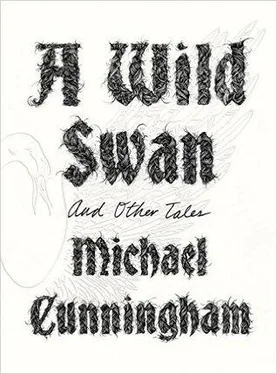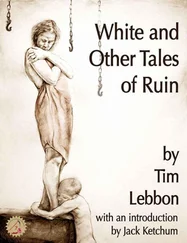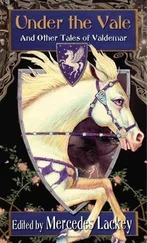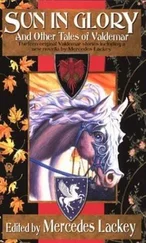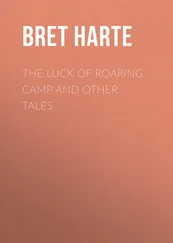The king’s court made jokes about the swan-winged prince, which his eleven flawlessly formed brothers took up readily, insisting they were meant only in fun. The young nieces and nephews, children of the eleven brothers, hid whenever the twelfth son entered a room, and giggled from behind the chaises and tapestries. His brothers’ wives asked repeatedly that he do his best to remain calm at dinner (he was prone to gesticulating with the wing while telling a joke, and had once flicked an entire haunch of venison against the opposite wall). The palace cats tended to snarl and slink away whenever he came near.
Finally he packed a few things and went out into the world. The world, however, proved no easier for him than the palace had been. He could get only the most menial of jobs. He had no marketable skills (princes don’t), and just one working hand. Every now and then a woman grew interested, but it always turned out that she was briefly drawn to some Leda fantasy or, worse, hoped her love could bring him back his arm. Nothing ever lasted. The wing was awkward on the subway, impossible in cabs. It had to be checked constantly for lice. And unless it was washed daily, feather by feather, it turned from the creamy white of a French tulip to a linty, dispiriting gray.
He lived with his wing as another man might live with a dog adopted from the pound: sweet-tempered, but neurotic and untrainable. He loved his wing, helplessly. He also found it exasperating, adorable, irritating, wearying, heartbreaking. It embarrassed him, not only because he didn’t manage to keep it cleaner, or because getting through doors and turnstiles never got less awkward, but because he failed to insist on it as an asset. Which wasn’t all that hard to imagine. He could see himself selling himself as a compelling mutation, a young god, proud to the point of sexy arrogance of his anatomical deviation: ninety percent thriving muscled man-flesh and ten percent glorious blindingly white angel wing.
Baby, these feathers are going to tickle you halfway to heaven, and this man-part is going to take you the rest of the way.
Where, he asked himself, was that version of him? What dearth of nerve rendered him, as year followed year, increasingly paunchy and slack-shouldered, a walking apology? Why was it beyond his capacities to get back into shape, to cop an attitude, to stroll insouciantly into clubs in a black lizardskin suit with one sleeve cut off?
Yeah, right, sweetheart, it’s a wing, I’m part angel, but trust me, the rest is pure devil.
He couldn’t seem to manage that. He might as well have tried to run a three-minute mile, or become a virtuoso on the violin.
He’s still around. He pays his rent one way or another. He takes his love where he can find it. In late middle age he’s grown ironic, and cheerful in a toughened, seen-it-all way. He’s become possessed of a world-weary wit. He’s realized he can either descend into bitterness or become a wised-up holy fool. It’s better, it’s less mortifying, to be the guy who understands that the joke’s on him, and is the first to laugh when the punch line lands.
Most of his brothers back at the palace are on their second or third wives. Their children, having been cosseted and catered to all their lives, can be difficult. The princes spend their days knocking golden balls into silver cups, or skewering moths with their swords. At night they watch the jesters and jugglers and acrobats perform.
The twelfth brother can be found, most nights, in one of the bars on the city’s outer edges, the ones that cater to people who were only partly cured of their curses, or not cured at all. There’s the three-hundred-year-old woman who wasn’t specific enough when she spoke to the magic fish, and found herself crying, “No, wait, I meant alive and young forever,” into a suddenly empty sea. There’s the crownletted frog who can’t seem to truly love any of the women willing to kiss him, and break the spell. There’s the prince who’s spent years trying to determine the location of the comatose princess he’s meant to revive with a kiss, and has lately been less devoted to searching mountain and glen, more prone to bar-crawling, given to long stories about the girl who got away.
In such bars, a man with a single swan wing is considered lucky.
His life, he tells himself, is not the worst of all possible lives. Maybe that’s enough. Maybe that’s what there is to hope for — that it merely won’t get any worse.
Some nights, when he’s stumbled home smashed (there are many such nights), negotiated the five flights up to his apartment, turned on the TV, and passed out on the sofa, he awakes, hours later, as the first light grays the slats of the venetian blinds, with only his hangover for company, to find that he’s curled his wing over his chest and belly; or rather (he knows this to be impossible, and yet…) that the wing has curled itself, by its own volition, over him, both blanket and companion, his devoted resident alien, every bit as imploring and ardent and inconvenient as that mutt from the pound would have been. His dreadful familiar. His burden, his comrade.
It’s the solitude that slays you. Maybe because you’d expected ruin to arrive in a grander and more romantic form.
You ran, as your mother put it, with a fast crowd. You threw off your schoolgirl plaids early, lied your way to adulthood in taverns three towns away, encouraged the men there to put first their fingers and then other parts into whatever interlude of skin you were able to offer them in the dimness of alleys, the little patches of neglected grass that passed for parks.
You went through three husbands, and joked to your girlfriends that with each marriage you’d thought you’d reached bottom, only to find that the elevator of love went to still lower floors. You decided against husband number four because, by then, even you could see the nascent defeat in his plans for the future. You could hear the muttered, gin-marinated accusations to come.
After you’d dispatched the fourth candidate, you embarked on a career of harshly jovial sluttishness. You were in your forties. By then your girlfriends had all married tolerable men and gradually, over time, found more and more reasons not to meet you for drinks ( Sorry, but the children wear me out; I’d love to, but you know how my husband gets when I come home loaded ).
It struck you, during your forties and then your fifties, as a personal victory. You weren’t sweeping splintery floorboards as your husband sat bemoaning the bleak fate you’d helped make for him, the job that barely paid for heat and light; you weren’t pressing a fifth infant to breasts increasingly unwilling to produce more than thimblefuls of milk. Your solution to your slackening body was squeezing it into ever-tighter dresses until, by the time sixty loomed, it seemed as if the dresses themselves held you upright on the bar stools; that if they were cut away, you’d spill onto the floor and lie there, helpless, a pink-white muddle of overused flesh.
You let that lost tooth remain a black square in your knowing smile. You dyed your hair: circus orange, followed by a maroon deep enough to verge on purple, followed by white-hot blond.
You were undeluded. You believed you were undeluded. You were thinking, “House of the Rising Sun”—a wised-up, whorish finish, with its scattered rhinestones still sewn on here and there. You imagined, in the long run, a perversely glorious, housebound lasciviousness; a reputation for insanity among the zealots who worshipped banal virtues as if they were glory incarnate. You expected late-night visits from the local young bucks (yes, you thought about your old girlfriends’ sons), in search of the instruction you’d provide ( Put your fingertip there, right there, pinch gently, very gently, I promise you she’ll love it ); boys who’d be grateful for the nights of ecstatic transport you’d visit upon them, and, more touching still, for the mornings they’d wake with faces buried in your breasts, abashed, embarrassed, eager to depart, in which endeavor you’d encourage them (you’d cultivate no hint of desperation, never urge them to stay). During the brief interludes before they jumped up to search for their socks and underwear, you’d assure them that they were marvels, they were warriors; gifts in the making for some girl who’d be thankful forever for what you’d taught them in a single night.
Читать дальше
